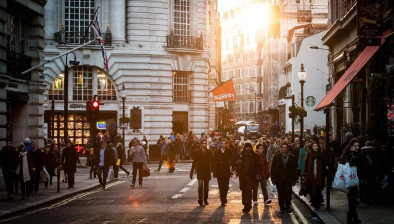UK headed for deepest recession on record, warns Bank of England

The Bank of England has warned that the coronavirus pandemic will force the UK economy towards its deepest recession on record.
The bank has revealed that the economy was on course to shrink 14% this year, based on the lockdown being relaxed in June.
Scenarios put together by the bank to illustrate the economic impact said that the coronavirus pandemic was “dramatically reducing jobs and incomes in the UK”.
The announcement comes after the bank decided to maintain interest rates at the record low of 0.1% implemented on March 20.
The Bank’s analysis was based on the estimation that social distancing measures will be gradually phased out between June and September, BBC News reports.
The Bank of England’s scenario showed the UK economy plunging into its first recession in more than a decade. The economy shrinks by 2.9% in the first quarter of 2020, followed by an unprecedented 25% decline in the three months to June.
This would push the UK into a technical recession, defined as two consecutive quarters of economic decline.
For the year as a whole, the economy is expected to contract by 14%. This would be the largest annual decline on record, according to Office for National Statistics (ONS) data dating back to 1949.
UK growth is expected to rebound in 2021 to 15%, however, the size of the economy is not expected to get back to its pre-virus peak until the middle of next year.
Yet, the Bank expects no lasting damage from the pandemic, with the economy, employment and earnings gradually returning to pre-virus growth rates.
Kevin Brown, savings specialist at Scottish Friendly, commented: “The Bank of England’s report on the economy makes for bleak reading, but it is still holding out hope for a reversal of much of the economic misfortune the country is suffering thanks to coronavirus, by the middle of next year.
“Markets have largely responded to the crisis already and much of this fresh economic data is already priced in. It is impossible to predict a bottom, but one thing’s for sure, savers won’t find succour in a savings account paying 0.5% interest.
“It’s a tough time for savers out there and many are being caught out by the speed at which rates on cash accounts are changing. The signals given out by the Bank of England suggest the base rate is going nowhere and this should be a catalyst to anyone with a savings pot to make sure they’re getting the best out of it, by considering ways to maximise their potential returns.
“Many high street banks, building societies and challenger banks are cutting rates but there can still be ways to generate above inflation returns by exploring alternatives such as regular savings accounts, longer fixed-rate ISAs and stocks and shares.”
- Read all of our articles relating to COVID-19 here.







